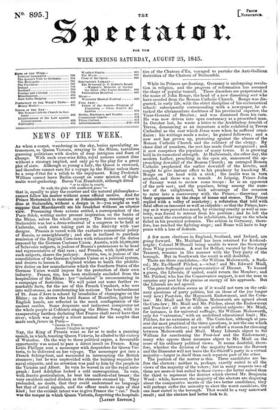NEWS OF THE WEEK.
As when a comet, wandering in the sky, busies speculating as- tronomers, so Queen Victoria, straying to the Rhine, tantalizes guessing politicians with doubts of deep intrigues and fears of change. With such over-wise folks, royal persons cannot dine without a strategy implied, and only go to the play for a great plot of state. Although so young a lady, the Queen is crowned, and therefore cannot care for a voyage up the Rhine unless there be a coup d'etat for a relish to the enjoyment. King Frederick William cannot leave Berlin except on some mission of diplo- matic wool-gathering. Baron Von Humboldt, although fitted
"or to shine in courts,
Or walk the plain with unaffected grace "— that is, equally to play the courtier and the natural philosopher— cannot follow his master without some official motive. And for Prince Metternich to rusticate at Johannisberg, running over to dine at Stolzenfels, without a design in it—you might as well *appose that Macchiavelli ate his breakfast without an ulterior iiew. Presuming those axioms settled, a correspondent of the Paris Siècle, writing under present inspiration on the banks of the Rhine, solves the whole mystery. The festive meeting at Stolzenfels was but a dress-rehearsal of a congress to be held at Carlsruhe, each state taking part in the festivity with vast designs. Prussia is vexed with the exclusive commercial policy of Russia, so unneighbourly ; and also is inclined to purchase remission of the English Corn-laws with relaxation of the duties imposed by. the German Customs Union. Austria, with 16,000,000 of Sclavomc subjects, is jealous of Russia's pretensions to be head and representative of that race ; and Prussia, with 3,000,000 of such subjects, shares the jealousy. Austria, too, is jealous of the consolidation of the German Customs Union as a political system, and desires to loosen it. England wishes to baulk the prohibi- tive duties on her manufactures which the Southern States of the German Union would impose for the protection of their own industry. France, too, has been studiously: excluded from the hospitalities of the Rhine : her "isolation" is recommencing in a campaign of festivities. We will point out some further re- markable facts, for the use of this French Urquhart, who sees into mill-stones, as corroborating his notions. The bombardment of St. Jean d'Acre is echoed by broadsides of champagne on the Rhine ; on its shores the lurid. flames of Mourillon, lighted by English hands, are reflected in the mock conflagration of the ancient castles. Some desperate and indiscreet conspirator set the whole people at Coblentz singing the Rhine Song, with its exasperating burthen declaring that France shall never have that river; which was• clearly a retort musical for the couplet that made such furore in Paris- " Jamais en France,
Jamais ne regnera."
Nay, the King of Prussia went so far as to make a punning speech, in which, toasting Queen Victoria, he alluded to the victory of Waterloo. On the way to these political orgies, a favourable opportunity was seized to pass a direct insult on France. King Louis Philippe sent a messenger with despatches for Queen Vic- toria, to be delivered on her voyage. The messenger got into a French fishing-boat, and succeeded in intercepting the British steamers ; but he was unprovided with the bunting requisite for naval etiquette, and no attention was paid to him by the people in the Victoria and Albert. In vain he waved in air the royal auto- graph : Lord Adolphus looked a cold unrecognition. In vain, with frantic gesticulation, he beat his uniform-clad breast : the very swabbers smiled disdain as the steamers steamed by. They pretended, no doubt, that they could understand no language but that of naval signals, and the officer made no sign a that kind ; but the evident intent was to give France the "cut." Such was the temper in which Queen Victoria, forgetting the hospitali-
ties of the Chateau d'Eu, voyaged to partake the Anti-Gallican festivities of the Chateau of Stolzenfels.


























